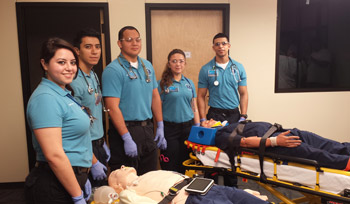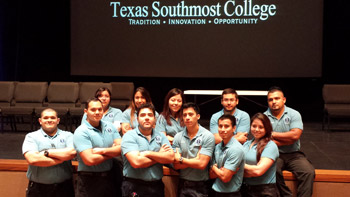Admission Requirements |
|
Due to the specialized nature of becoming a paramedic and entering into the Emergency Medical Science Program, admission requirements are more rigid than for entrance into the general programs offered by TSC. Requirements for admission to the Emergency Medical Science Program are as follows:
Students seeking to obtain an Associates of Applied Science or Certificate of Proficiency - Level 1 or Certificate of Proficiency - Level 2 must complete the application requirements located on this webpage. The EMS Program has a limitation of how many students it can take with each new admitted cohort. This is based on clinical site access. Once an application to the program has been submitted, prospective students for the EMS program will attend an informational meeting with the EMS Program Director in order to answer any questions and understand the expectations and requirements of this program of study. Students are selected based on scoring from this form against all applicants to the EMS Program for the respective application cycle. Applications are reviewed by a committee of EMS Program faculty and decisions regarding which students to admit will be made near the end of June with notification of acceptance or denial being sent before July 4th. Accepted students will need to reply to the email within 7-10 days. Accepted students will be required to attend a mandatory orientation (the date and time will be included in the acceptance letter). Topics included will be: required immunizations; health insurance requirements; criminal background check; attendance requirements; drug screening; and other topics specific to the current degree plan. SPECIAL REQUIREMENTS
Effective September 1, 2017, HB 1508, 85th Leg., R.S. (2017), amended Chapter 53 of the Texas Occupations Code to add Subchapter E relating to notice to applicants to and enrollees in certain educational programs regarding the consequences of criminal conviction on eligibility for an occupational license. Pursuant to Chapter 53, Subchapter E, of the Texas Occupations Code, please be advised that Texas Southmost College offers programs that lead to an occupational license as defined under Texas Occupations Code 58.001. Licensing authorities may have guidelines concerning prior criminal convictions that would make an individual ineligible for issuance of a given license. If you are enrolled in a program that may prepare an individual for an occupational license and/or if you later decide to change to a program that prepares you for an occupational license as defined under Texas Occupations Code 58.001, in accordance with state law, please be advised of the following:
Note that the provisions of Chapter 53 of the Texas Occupations Code relating to the consequences of criminal conviction do not apply to licenses granted by the Supreme Court of Texas, law enforcement officers (Texas Occupations Code Chapter 1701), emergency medical services personnel (Texas Health and Safety Code Chapter 773), or persons licensed by the Texas Medical Board, the Texas State Board of Pharmacy, the State Board of Dental Examiners, or the State Board of Veterinary Medical Examiners that have been convicted of a felony under Chapter 481 or 483 or Section 485.003 of the Texas Health and Safety Code. If you are seeking one of these licenses, please be aware that other provisions of the law may be applicable relating to the consequences of criminal conviction. All applicants to and enrollees of Texas Southmost College are encouraged to review all applicable eligibility requirements related to the respective occupational license. Questions related to eligibility requirements should be directed to the applicable licensing authority. |
| Last Updated on Friday, 12 July 2019 14:18 |





